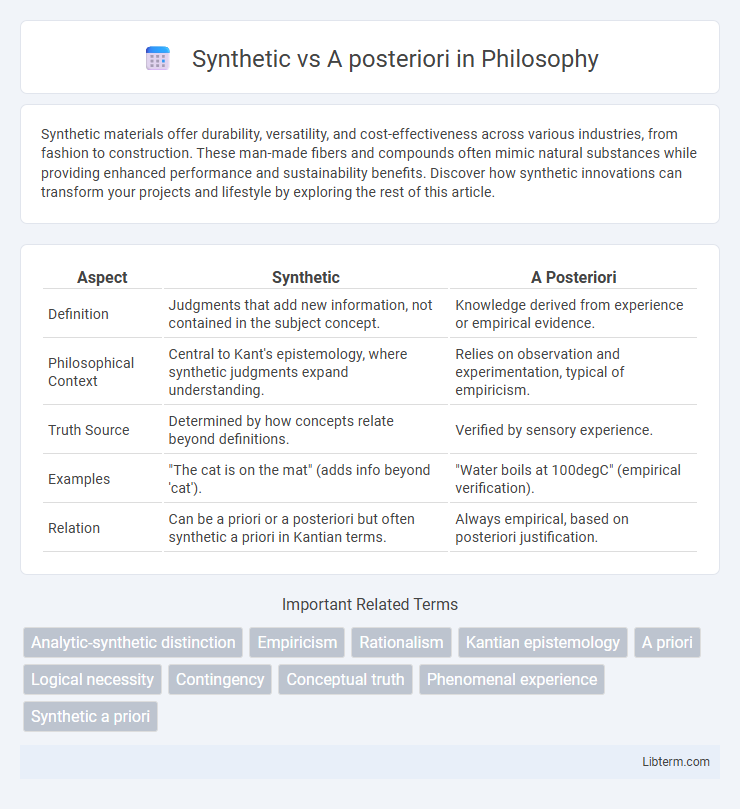Synthetic materials offer durability, versatility, and cost-effectiveness across various industries, from fashion to construction. These man-made fibers and compounds often mimic natural substances while providing enhanced performance and sustainability benefits. Discover how synthetic innovations can transform your projects and lifestyle by exploring the rest of this article.
Table of Comparison
| Aspect | Synthetic | A Posteriori |
|---|---|---|
| Definition | Judgments that add new information, not contained in the subject concept. | Knowledge derived from experience or empirical evidence. |
| Philosophical Context | Central to Kant's epistemology, where synthetic judgments expand understanding. | Relies on observation and experimentation, typical of empiricism. |
| Truth Source | Determined by how concepts relate beyond definitions. | Verified by sensory experience. |
| Examples | "The cat is on the mat" (adds info beyond 'cat'). | "Water boils at 100degC" (empirical verification). |
| Relation | Can be a priori or a posteriori but often synthetic a priori in Kantian terms. | Always empirical, based on posteriori justification. |
Introduction to Synthetic and A Posteriori Knowledge
Synthetic knowledge involves propositions whose truth depends on empirical verification and the way the world is, extending beyond mere definitions. A posteriori knowledge is acquired through experience and observation, contrasting with a priori knowledge that is independent of empirical evidence. Understanding the distinction between synthetic and a posteriori knowledge is crucial for epistemology and the philosophy of science, as it shapes how knowledge claims are validated.
Defining Synthetic Judgments
Synthetic judgments extend knowledge by connecting predicates to subjects in ways not contained within the subject's definition, relying on empirical experience to validate their truth. They contrast with a posteriori judgments, which are grounded specifically on sensory data and observations, making their truth contingent upon external evidence. Understanding synthetic judgments is crucial for distinguishing knowledge that expands understanding beyond mere analytical truths.
Understanding A Posteriori Knowledge
A posteriori knowledge is derived from empirical evidence and sensory experience, making it essential for scientific inquiry and practical decision-making. It contrasts with synthetic a priori knowledge, which is independent of experience yet informative about the world. Understanding a posteriori knowledge involves recognizing how data collection, observation, and experimentation contribute to justified beliefs and knowledge validation.
Historical Perspectives: Kant and Beyond
Immanuel Kant revolutionized epistemology by distinguishing synthetic a priori judgments, which expand knowledge independently of experience yet necessarily, from a posteriori judgments, grounded in empirical observation. Kant's critical philosophy challenged the empiricist tradition, asserting that certain fundamental concepts, such as causality and space, are synthetic a priori, shaping how experience is structured. Subsequent philosophers, including the logical positivists, revisited this distinction to clarify analytic and synthetic knowledge, refining the understanding of a priori knowledge beyond Kant's original framework.
Key Differences Between Synthetic and A Posteriori
Synthetic judgments are statements whose truth depends on how their concepts relate to the world, whereas a posteriori knowledge is derived from empirical experience and observation. Synthetic knowledge often involves combining concepts to produce new information not contained in the subject alone, while a posteriori knowledge specifically relies on evidence gathered through sensory input. The key difference lies in synthetic judgments being about the nature of truths that are not analytically contained in definitions, whereas a posteriori knowledge always depends on experiential data for validation.
Philosophical Significance in Epistemology
Synthetic knowledge expands understanding by combining concepts with empirical experience, enabling meaningful, informative propositions beyond mere definitional truths. A posteriori knowledge relies on empirical evidence, grounding concepts in observable phenomena, which shapes the foundation of scientific inquiry and justifies beliefs through sensory data. Philosophically, the distinction influences debates on how humans acquire knowledge, with synthetic a posteriori judgments underscoring the limits and reach of empirical justification in epistemology.
Real-World Examples: Applications and Implications
Synthetic knowledge, derived from a priori reasoning, is foundational in mathematics and logic, exemplified by geometric proofs and arithmetic principles that require no empirical verification. A posteriori knowledge relies on empirical evidence, applicable in scientific fields such as biology and physics, where experiments and observations validate hypotheses about natural phenomena. In real-world applications, synthetic a priori judgments underlie theoretical frameworks guiding technological innovation, while a posteriori knowledge drives data analysis and practical decision-making in domains like medicine and environmental science.
Common Misconceptions and Clarifications
Synthetic judgments expand knowledge by adding information not contained in the subject concept, whereas a posteriori knowledge derives from empirical experience. A common misconception is that synthetic judgments are purely theoretical, but they often rely on sensory data to establish truths. Clarifying this distinction helps prevent confusion between empirical verification and logical analysis in philosophical discussions.
Debates and Controversies in Modern Philosophy
Debates surrounding synthetic versus a posteriori knowledge center on the nature of epistemic justification and the origins of concepts. Critics challenge Immanuel Kant's claim that synthetic a priori knowledge exists, arguing that all synthetic knowledge must be derived empirically, thus aligning with a posteriori conditions. These controversies influence ongoing discussions in epistemology, the philosophy of language, and metaphysics, shaping interpretations of knowledge acquisition and conceptual analysis.
Conclusion: Impact on Knowledge and Thought
Synthetic judgments expand knowledge by connecting concepts beyond mere definitions, enabling new insights and empirical understanding. A posteriori knowledge, grounded in experience, shapes thought through observation and evidence, refining beliefs based on sensory input. The interplay between synthetic and a posteriori elements drives the evolution of knowledge, influencing how ideas are formed, validated, and integrated within philosophical and scientific frameworks.
Synthetic Infographic

 libterm.com
libterm.com